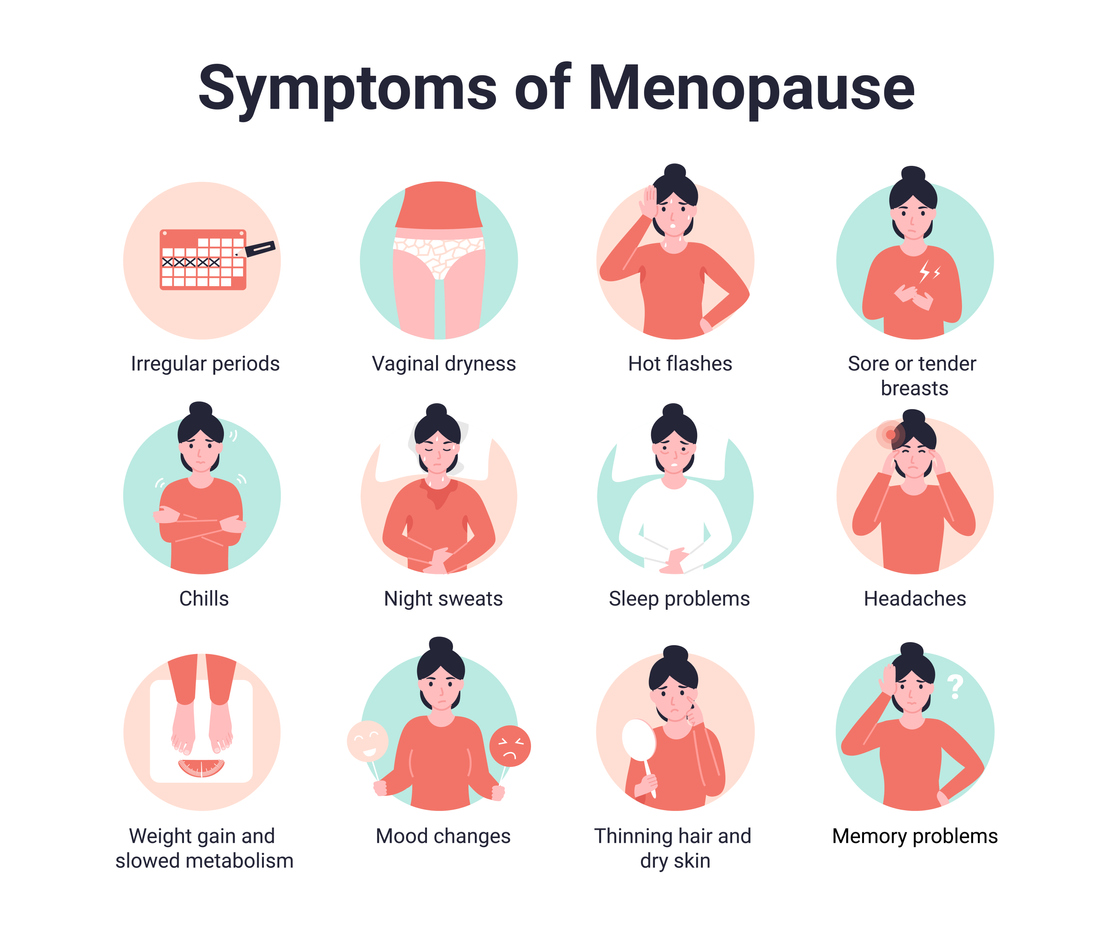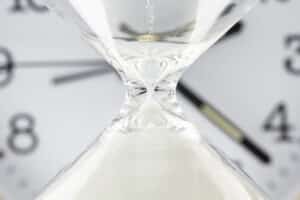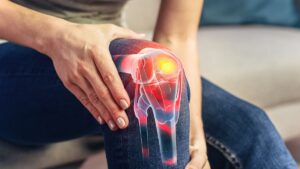Some women ease through the stages of menopause, their symptoms fairly slight, periodic and overall about as annoying as a bad period. Others endure more debilitating symptoms. Regardless of which category you fall into, virtually every woman has questions about what is menopause. That’s why we created the PRiME Women Guide to Menopause. We kicked off this series with our guide on perimenopause, the precursor stage of menopause. In this guide, we tackle the stages of menopause and answer the questions most women have on this unavoidable part of every woman’s life journey. What is menopause? What causes low libido in menopause? Read on to find out.
Have a specific question? Skip ahead to the part that matters most to you:
- What is menopause?
- What is the average age of menopause?
- What are the stages of menopause?
- What is menopausal depression?
- What are menopause headaches?
- What can I do about weight gain during menopause?
- What causes the growth of facial hair during menopause?
- What causes low libido during menopause?
What is menopause?
The short answer is that menopause is the cessation of menstruation. Your fertile years are over because the ovaries, which produce the eggs necessary to become pregnant, stop producing eggs. The change occurs as the hormonal levels in the body change; estrogen production levels drop, as does testosterone — both which are a vital part of the reproductive process.
What is the average age of menopause?
The average age of menopause is variable, just as the age a girl can begin menstruating is not absolute. That said, for many women the average age of menopause is between 45 and 50, with some experiencing it earlier and others later. Some of it has to do with genetics. If your mother entered menopause later in life, you might, too. WebMD lists four factors, however, that could influence a woman’s average age of menopause:
Smoking: The site notes that no other lifestyle choice does more damage to a woman’s ovaries than smoking.
Chemotherapy: Many forms of chemotherapy are toxic to the ovaries on some level. WebMD says many women go through temporary menopause while undergoing chemotherapy.
Ovarian surgery: Any operation on the ovaries creates scar tissue, which in turn can impact the onset of menopause. A hysterectomy that includes the removal of the ovaries with the uterus would cause a woman to enter menopause quickly. If only the uterus is removed, however, a woman would not necessarily experience menopausal symptoms because her ovaries would still be producing the hormones that put off menopause.
Ethnicity: The average age of menopause for African American and Latino women is a little earlier than some Caucasian women, for whom the average age of menopause is 51.5. Chinese and Japanese women typically reach menopause later, WebMD says.
WebMD says the following factors are not generally important when determining the average age of menopause for a woman:
Age of first period: Although the average age at which a girl in the U.S. will begin her period has dropped from 13.3 years old in women born prior to the 1920s to 12.4 years old today. The average age of menopause, however, has remained consistent at 51.5 years old.
Pregnancy and breastfeeding: A common myth, there is no scientific evidence to prove that being pregnant or breastfeeding children earlier in life affects the onset of menopause.
Use of hormonal birth control: Birth control might stop ovulation, but it doesn’t stop the rest of the process relating to follicles and eggs, the parts relevant to maintaining hormone levels, so WebMD says it doesn’t seem to affect the average age of menopause.
What are the stages of menopause?
The stages of menopause include perimenopause, menopause and postmenopause. In perimenopause, a woman begins to produce less estrogen, with symptoms that could include irregular or heavier/lighter periods, hot flashes, vaginal dryness, sleep disturbances and mood swings. Menopause officially begins after a woman has not had a period for 12 consecutive months. The final stage of menopause is postmenopause. This phase would be the rest of a woman’s life after menopause. Estrogen levels continue to decrease at this time, so symptoms such as vaginal dryness and hot flashes and/or night sweats could continue. Lower hormone levels at this time also increase a woman’s risk for diseases like osteoporosis.
What is menopausal depression?
Menopausal depression is a real phenomenon and can be caused by a number of factors. The North American Menopause Society lists unpredictable hormone fluctuations, stress, body image, libido, infertility and aging as among the reasons why some women find themselves in a menopausal depression at this time of life. Whether you are simply in a depressed mood or in an actual depression, of course, is something to discuss with your medical practitioner.
In the meantime, you should know that mood swings, due in part to hormonal changes and that are a common perimenopause symptom, could continue for some women during menopause.
The University of Michigan Depression Center offers this list of symptoms, which might help you decide if you need to contact a professional for additional help. Solutions range from various lifestyle changes — exercise has been found to help some women — to therapy and medication.
Common symptoms of menopausal depression include:
- Two or more weeks of depressed mood
- Decreased interest or pleasure in activities
- Change in appetite
- Change in sleep patterns
- Fatigue or loss of energy
- Difficulty concentrating
- Excessive feelings of guilt or worthlessness
- Extreme restlessness or irritability
- Thoughts of suicide
The Center notes that depression and the onset of menopause can share many of the same symptoms — sleep problems, fatigue, irritability, anxiety and difficulty concentrating. Those similarities mean that depression could go undiagnosed and untreated longer than necessary.
What are menopause headaches?
Menopause headaches can be a common issue for some women in this phase of life, especially for those who have suffered from migraines up until that time. The migraines could worsen during perimenopause and menopause. WebMD says these menopause headaches can increase by 50-60% in women who regularly have migraines. Studies suggest that decreasing estrogen levels likely contribute to this pattern.
What can I do about weight gain during menopause?
Weight gain during menopause, especially around the belly, is a common complaint for women at this time of life. Studies suggest that lower levels of estrogen are part of the cause. The lower levels reduce the metabolic rate, which in turn makes it easier to gain weight while eating the same amount or kinds of food that you’ve always enjoyed. Your body just doesn’t burn the food as quickly. Lowered estrogen levels might also cause a woman’s body to use starches and blood sugar less effectively. This, in turn, can increase fat storage and make it harder to lose weight.
But, lifestyle and aging are also factors in weight gain during menopause. Muscle mass typically diminishes as we age. Less muscle mass means the rate at which your body uses calories also diminishes. Keep eating the same and that waistline might keep expanding.
Weight gain during menopause does not have to be fait accompli, however. The Mayo Clinic offers these tips for keeping it under control:
Move more. The clinic recommends moderate aerobic activity (brisk walking counts) of at least 150 minutes a week.
Eat less. You might need to eat 200 fewer calories daily in your 50s than you did in your 30s and 40s just to maintain your current weight, the clinic says.
Check your sweets habit. The average American diet includes about 300 calories of added sugars daily. One easy place to cut back is on those sugar-sweetened beverages.
Drink less alcohol. If you’re looking to cut those 200 calories referenced above, cutting back on that Chardonnay is one easy place to start.
What causes the growth of facial hair during menopause?
For many women, one of the most upsetting indignities of their adult lives is the growth of facial hair. During menopause, this could be anything from a few errant chin hairs to heavier growth on the upper lip. Regardless, facial hair during menopause leaves most women yelling at their mirrors. At this stage, when women could be thinking is this so bad, or what? Is menopause something that will affect me forever?, it can be a difficult symptom to handle.
As with other symptoms, the growth of facial hair during menopause is the work of hormones — more specifically, the lack of estrogen and the relationship between the levels of estrogen and testosterone. The hormone that controls the type of hair on your face is DHT, or dihydrotestosterone. When a woman is fertile, MenopauseRX says, the ratio of estrogen production to testosterone is higher, which keeps the production of DHT low. As menopause approaches and estrogen levels drop, DHT increases in the hair follicles on a woman’s face, which changes it from the almost invisible peach fuzz to the coarser, longer and sometimes even darker hair found in men. The good news is that for most women, a good pair of tweezers is all they need to keep this annoying development at bay.
What causes low libido during menopause?
On some levels, low libido during menopause might be more a coincidence of timing that a symptom of menopause itself. Decreasing sexual desire can happen to both men and women as they age, although women are two to three times more likely to be affected, according to the North American Menopause Society. That said, low libido during menopause can occur, in part, as a result of some common menopause symptoms, including vaginal dryness, night sweats and hot flashes. The decrease in testosterone that happens in menopause also can affect sexual desire since that hormone plays some role (still being studied) in women’s sex drive and sexual sensation.
Menopause doesn’t have to be a hardship, though it can cause very real, very difficult symptoms in many women. If you’re experiencing symptoms that you think could be related to this change of life, and if you’re wondering what is menopause really like and how it could be affecting you, your primary care provider is the best place to start to get answers.
Read Next:
Hot Flashes Ahead: How to Manage Your Hot Flashes During Summer Months and Beyond
The Weird Perimenopause Symptoms No One Tells You About







